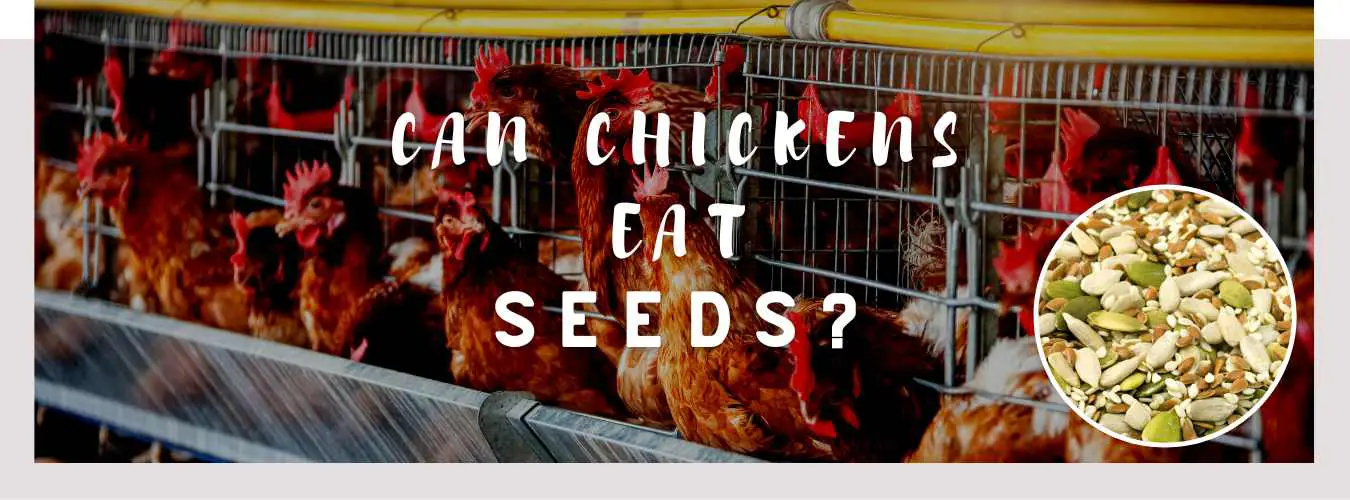
Chickens are known for their versatile diet, often seen pecking around for various foods. A common question among poultry enthusiasts and backyard chicken keepers is, “Can chickens eat seeds?” This article aims to provide a comprehensive answer to this query, focusing on the benefits, potential risks, nutritional aspects, and guidelines for feeding seeds to chickens.
By nature, chickens are omnivores, meaning they consume both plant and animal-based foods. In the wild, their diet includes seeds, insects, and greens. Domesticated chickens retain these dietary preferences, making seeds a natural and familiar choice for them.
Nutritional Benefits of Seeds for Chickens
Seeds are packed with essential nutrients beneficial for chickens. They are a great source of protein, which is crucial for egg production and overall health. Seeds also contain healthy fats that provide energy and help in the absorption of fat-soluble vitamins. Additionally, they are rich in vitamins and minerals, such as vitamin E, calcium, and phosphorus, which contribute to strong bones and a robust immune system.
The Variety of Seeds and Their Benefits
Different seeds offer varied nutritional profiles. For instance:
- Sunflower Seeds: High in protein and fat, they are excellent for feather growth and energy.
- Pumpkin Seeds: Known for their natural deworming properties.
- Millet: Easy to digest and a good energy source.
- Flax Seeds: Rich in Omega-3 fatty acids, beneficial for healthy eggs.
You might also like: Can Chickens Eat Spring Mix?

Potential Risks and Precautions
While seeds are generally safe for chickens, there are some precautions to consider:
- Choking Hazard: Large seeds should be broken or crushed to prevent choking.
- Toxic Seeds: Certain seeds, like apple seeds, contain compounds that can be toxic to chickens in large quantities.
- Unbalanced Diet: Relying solely on seeds can lead to nutritional imbalances. Seeds should be part of a varied diet.
Recommended Quantity and Frequency
Seeds should be given as a supplement to a well-balanced diet. A handful of seeds per chicken per day is a good measure. It’s important to observe how your chickens react to different types of seeds and adjust accordingly.
Practical Tips for Feeding Seeds to Chickens
- Mixing Seeds: Combine different types of seeds to provide a range of nutrients.
- Sprouting Seeds: Sprouted seeds are a great way to enhance their nutritional value.
- Feeding Time: Offer seeds during the late afternoon after they’ve consumed their regular feed.
Integrating Seeds into a Chicken’s Diet: Best Practices
Incorporating seeds into a chicken’s diet requires a thoughtful approach to ensure they derive maximum benefit. Here are some best practices:
Introduce seeds gradually into their diet. This allows you to monitor their health and preferences, ensuring they don’t experience any digestive issues.
Certain seeds may be more beneficial at different times of the year. For example, high-fat seeds like sunflower seeds are excellent during colder months for extra energy and warmth.
Create seed-based treats or scatter seeds in their foraging area. This not only provides nutrition but also encourages natural foraging behavior, which is beneficial for their mental and physical health.
You might also like: What Can Chickens Eat?
The Role of Seeds in Egg Production

Seeds can play a significant role in the quality of egg production. The protein content in seeds is crucial for the development of strong, healthy eggs. Omega-3 fatty acids, especially from flax seeds, can improve the nutritional quality of the eggs, making them healthier for human consumption.
Balancing with Other Foods
While seeds are beneficial, they should be balanced with other food sources like vegetables, grains, and commercial chicken feed, which provide other essential nutrients not found in seeds.
To appreciate why seeds are a good fit for a chicken’s diet, it’s helpful to understand their digestive system. Chickens have a unique digestive tract that includes a crop, where food is stored and softened; a gizzard, which grinds the food with the help of grit; and the intestine, where nutrients are absorbed. Seeds, being small and easily digestible, are well-suited to this system.
When feeding seeds, especially harder varieties, ensure chickens have access to grit. Grit aids in the grinding process in the gizzard, helping them digest the seeds more effectively.
Seed Storage and Quality
The quality and storage of seeds are crucial. Always use fresh, high-quality seeds. Store them in a cool, dry place to prevent mold and spoilage. Moldy or spoiled seeds can be harmful to chickens.
Stay away from seeds that are salted, seasoned, or coated in sugar or chocolate, as these can be harmful to chickens.
When selecting seeds, consider the source. Opt for organic, non-GMO seeds when possible, as these are healthier for chickens and better for the environment. Supporting sustainable and ethical farming practices is also beneficial for the broader ecosystem.
Final Thoughts
In conclusion, seeds are a healthy and beneficial addition to a chicken’s diet. They provide essential nutrients that support the overall well-being of the chickens. However, it’s crucial to feed them in moderation and as part of a balanced diet. By understanding the types of seeds and their benefits, along with the recommended quantities and precautions, chicken keepers can ensure their feathered friends are happy, healthy, and well-nourished.
Contents










